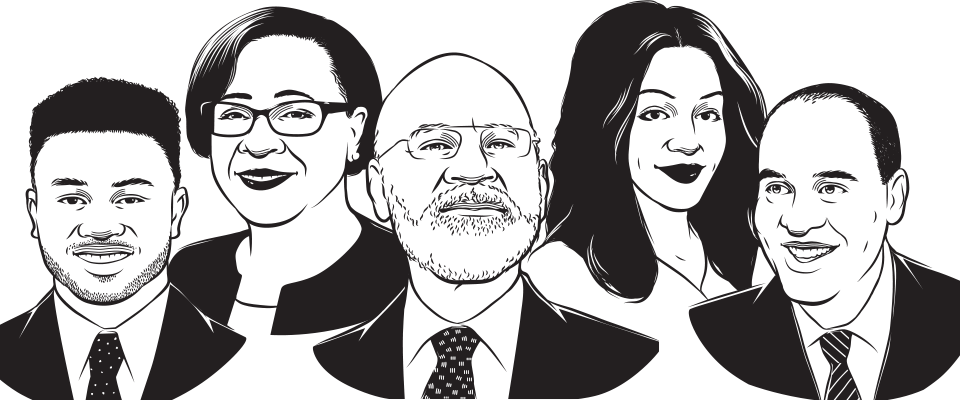For these athletes, Berkeley was just the beginning.
1. Kurt Streeter

Over his long journalistic career, Kurt Streeter has spent time at ESPN, the Los Angeles Times, and the Baltimore Sun. But since 2017, he has been writing features and essays for the New York Times, his stories focusing on the intersection of sports, culture, politics, race, and gender. With athletic activism on the rise in the U.S., it’s been a rich beat to cover. At UC Berkeley, Streeter was a star tennis player, world-ranked in both singles and doubles, one of a relatively small number of African American standouts in a white-dominated sport. In a lengthy 1987 Daily Cal interview with reporter Michael Silver, Streeter said, “Most Black players pull for you. … It’s kind of like a fraternity. There aren’t too many of us, but we’re coming up.” —Dylan Svoboda
2. Cynthia Marshall

In the late 1970s, Cynthia “Cynt” Marshall became the first Black female cheerleader at Cal. She has been a pioneer ever since. In 2018, Marshall was named CEO of the Dallas Mavericks, making her the first Black female CEO in the NBA’s 71-year history. At the time, the Mavericks had no other women or minorities in permanent leadership roles. Now, the team’s leadership is nearly 50 percent women and 47 percent people of color. “Diversity is about numbers and representation,” said Marshall. “Inclusion is how to create a culture that’s welcoming.” In pursuit of such a culture, Marshall makes everyone on her executive team read The Power of Nice: How to Conquer the Business World with Kindness. When faced with a global pandemic and a league-wide shutdown earlier this year, the Cal alum handled the crisis with compassion, “crunching numbers” in order to continue paying her staff. —Maddy Weinberg
3. Thelton Henderson

In August, Judge Thelton Henderson received the George H.W. Bush Distinguished Alumnus Award from the National College Baseball Hall of Fame. The award—whose namesake played for the Yale baseball team that was bested by Cal in the first-ever NCAA College World Series in 1947—honors former college baseball players who have achieved greatness beyond the diamond. One of just two Black students in his class at Berkeley Law, Henderson went on to become the first Black lawyer in the U.S. Department of Justice Civil Rights Division and later a U.S. district judge for the Northern District of California. Since retiring in 2017, he has served as a distinguished visiting professor at Berkeley Law. Henderson is also a board member at Stiles Hall, the nonprofit that assists underrepresented students. He describes his involvement with Stiles as his “single most valuable and meaningful experience” at Cal. —M.W.
4. Mika Hilaire

Mika Hilaire ’96, who ran track and played basketball at Cal, went on to get her J.D. at UC Hastings in 2000. Her career since then has largely focused on employment law. Dubbed a “legal gladiator in high heels,” amid the burgeoning #MeToo movement, Hilaire represented more than a dozen women who accused Oakland-based chef Charlie Hallowell of sexual harassment and verbal abuse in his restaurants. More recently, she founded the Equal Rights Law Group, which she told the San Fernando Valley Business Journal is the “culmination of all of my 20 years of experience and really trying to establish myself as a civil rights lawyer.” The former college athlete (and professional poker player) is now representing the family of deceased University of New Mexico football player Nahje Flowers in a wrongful death suit against both the school and the NCAA. —Brooke Kottmann
5. Jaylen Brown

After a monthslong hiatus because of COVID-19, the NBA resumed gameplay in July 2020 with “Black Lives Matter” emblazoned on its courts. Boston Celtics star Jaylen Brown garnered attention, not only for his impressive performance in the playoffs but also his social activism. During post-game press conferences, the former California Golden Bear commented on systemic racism, police brutality, and voter suppression. In August, Brown reflected on the case of Jacob Blake, a Black man who was shot by police in Kenosha, Wisconsin. “People post my jersey all the time—No. 7. And every time I look at my jersey now, what I see is a Black man being shot seven times,” he said. “All America sees is his background. … It’s easier to see that than it is to see the truth.” Above the No. 7, Brown’s jersey now reads, “Liberation.” —M.W.


















